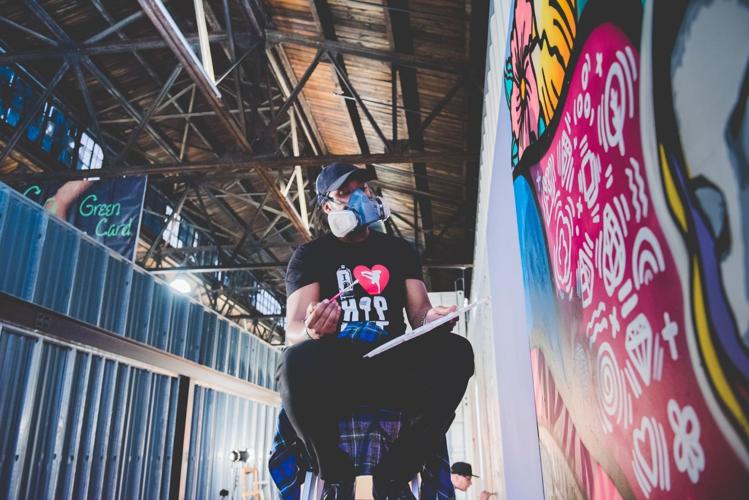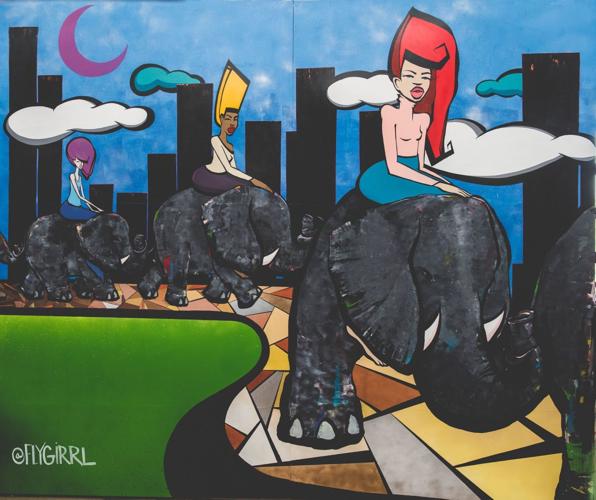The Tiny Room for Elephants Festival returns to Cherry Street Pier from July 8-24. Tiny Room for Elephants is a community of creatives seeking to create once-in-a-lifetime experiences for artists, brands and consumers through various artistic outlets. The festival was created to document the artists’ creative processes.
Founders Yaya Horne and Damian Ward shared what distinguished their festival and why the community should support the artist.
“Tiny Room for Elephants started as a creative experiment and incubator space. The idea was to have space for creatives to create and just document it. It turned from a ‘what if’ into a festival,” Ward said.
Horne added “that’s what is so unique about our event, you get to see the process from beginning to end. We have so much footage of artists interacting and exchanging tips and tricks.”
She also shared “Tiny Room for Elephants Festival went from underground to something more public facing. Starting in 2018 when we did this festival at Bok and 2019 when we did it at Cherry Street Pier, it grew. When we did it underground, we had to advertise via text messages due to the complexity of the location.”
It is through that underground scene that they were offered Cherry Street Pier, a bigger space with bigger visibility.
The benefits of holding the event in a publicly accessible location were greater. Curating an event is difficult enough, but selecting the artists can be even more difficult. Horne and Ward explained how they chose the artists to feature.
Ward stated, “from the conception, it’s been invite only. In 2014, we invited about 14 artists from different backgrounds. This has continued to today it’s still invite only. It’s all our art crushes.”
Horned co-signed by saying “We have art crushes we follow throughout the year, folks that we see popping up, some old and some new.”
They may be actively seeking new talent, but they have not forgotten the artists who have supported them since the beginning.
Their other mission is to narrow the diversity gap. The art world is still largely dominated by men.
“We want to be welcoming to women, disabled artists and lgbtqia+ artists,” Horne said.
Philadelphia, like many other major cities, makes it difficult to integrate newcomers into the establishment. This can be said of the art world, which sometimes rejects new ideas and entrepreneurs who take an unconventional path.
Horne specified “that if you come to our events and look around and know everyone, we are doing a bad job. We work hard to bring in new artists and new creatives into the space so that there is growth.”
Ward echoed the sentiment with “that’s from consumers, to who is painting next to whom, we try to place people next to whom they should know.”
The other issue is that while Philadelphia is a large city, it often lacks the infrastructure that its neighbors, like New York and Washington D.C, must generate when it comes to the creative arts.
While Damien understands people’s need to leave, he also said “you must plant your flag and stay.” In other words if everyone leaves and takes their talents elsewhere things will never improve.
The other issue is that there must be a better case made for art consumers to spend their money at home rather than places such as Florida, which hosts the famous Art Basel.
Horne and Ward are adamant about changing the conversation and making Philadelphia a vibrant art destination and home for artists.
For more information on Tiny Room for Elephants, visit tinyroomforelephants.com.












(0) comments
Welcome to the discussion.
Log In
Keep it Clean. Please avoid obscene, vulgar, lewd, racist or sexually-oriented language.
PLEASE TURN OFF YOUR CAPS LOCK.
Don't Threaten. Threats of harming another person will not be tolerated.
Be Truthful. Don't knowingly lie about anyone or anything.
Be Nice. No racism, sexism or any sort of -ism that is degrading to another person.
Be Proactive. Use the 'Report' link on each comment to let us know of abusive posts.
Share with Us. We'd love to hear eyewitness accounts, the history behind an article.